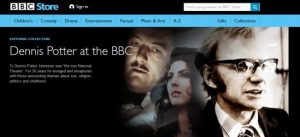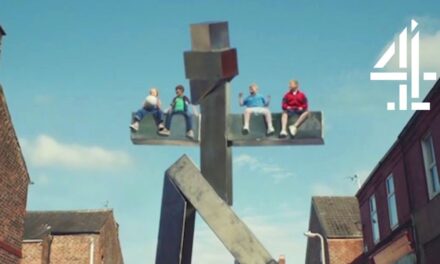Although starting its operations as a commercial venture in November 2015, the new online BBC Store has been under discussion for some time, gaining regulatory approval early in 2013. Its aim is to provide access to a wide range of BBC programmes for a fee. The 2013 proposal suggested that:
At launch it will offer around one year’s worth of recent programmes (c. 6,000 hours) and 4,000 hours of archive content, including around 3,000 hours of older titles that are currently available commercially (for example, on DVD or download-to-own). The remaining 1000 hours will be editorially selected.[i]
The Store sits side-by-side with iPlayer and is integrated into the catch-up service, so that content available to buy in the Store is searchable via the on-demand platform. It ‘will not affect the programming available free of charge as part of the BBC’s public services’, however, ‘it will supplement the public service offer by making available a broader range of BBC programmes, on a commercial basis.[ii]
https://youtube.com/watch?v=dRvV8dIeW0c
In so many ways the new online BBC Store is brilliant. Even in this early iteration, the possibilities of the platform are clear. It would obviously be folly to expect the archival floodgates to open up immediately, giving us access to everything that the BBC still retains in its archives (indeed such a utopian vision comes with its own problems – how would we find anything in such a ‘plentiful’ scenario?). But the indication is that carefully curated collections will provide access to a wide range of material new and old, well known and obscure.
The description of the store states that ‘From the latest shows the day after they’ve been on TV, to classic titles from the BBC archive, we are making more content available to you than ever before’. In addition, ‘There are also themed Collections, gathering together programmes from the BBC archive to bring you absorbing and enriching stories from the past, and guide you to new destinations’.
Once such collection which launched with the Store was a 17-title ‘Dennis Potter at the BBC’ retrospective. It’s perhaps not unsurprising that such a well-known figure was used to launch the service – the recent BFI retrospective means that the plays have already undergone some level of restoration and so would be ‘ready’ for such an airing. How less well-known or unrestored archival material fairs remains to be seen.

However, the benefit of the service is clear given that the Potter collection is not restricted to the obvious ‘big hitters’ and those previously released on DVD. Instead, well-regarded and memorable dramas such as Blue Remembered Hills (1979), Pennies from Heaven (1978) and The Singing Detective (1986) act as entry points into a wider back catalogue of titles which make available a number of plays (such as A Beast With Two Backs [1968], Blackeyes [1989], Double Dare [1976] etc.) which are otherwise unavailable on home media. Single plays cost £3.99; the price of series varies depending on length. In other words, the Potter collection on the BBC Store, opens up the opportunity to explore Potter’s extensive oeuvre (at the BBC) at one’s leisure, reaching well beyond the scope of any of the currently available DVD boxed sets. Similar range can be found elsewhere in the Store, in, for example, the collections based around Charles Dickens adaptations, BBC shows that have been ‘Reborn in the USA’, and ‘unflinching dramas that broke boundaries and shocked the nation’ in the ‘Courting Controversy’ collection. There’s also an increasing quantity of non-dramatic material available.
I’ve written in these parts before about my frustrations viewing online media streamed by the BBC on my television set. Without wishing to sound like a luddite, repeatedly (if metaphorically) attacking the technology of the future (or is it the present?), it’s an issue that I’d like to return to briefly here, because the mechanics of the BBC Store seem to manifest a short-sighted and polarised view of how digital technologies are used by viewers.
In a model that mirrors their iPlayer platform, the BBC Store offers the options of online streaming ‘via your browser on mobile, tablet, PC or Mac’ or the possibility of downloading programmes for offline viewing. Like iPlayer, the offline files are downloaded into an additional ‘download client’, a piece of software which manages the downloading, storage, availability and playback of the purchased episodes. The downloaded files are hidden in the ‘back end’ of the software, providing a reasonable anti-piracy measure but one that also prevents the easy transfer of purchased files between devices.
In theory this shouldn’t matter as the online versions can be accessed on iPhones, iPads, laptops and other tablets, and specialised apps are on the way which will replicate the offline client for tablets and smart phones.
https://youtube.com/watch?v=zyKXXnW7VHM
The frustration, however, comes from the BBC not providing any method of viewing programmes purchased through the BBC Store on a television set (either ‘old fashioned’ CRT or a ‘new-fangled’ smart TV). Indeed, this is implicit in one of the promotional videos, in which images on faux-historically situated television sets are transposed on to a series of portable screens in a demonstration of assumed progress. After making a direct enquiry to the BBC Store help desk as to whether this was possible, I received the following response:
The BBC Store is digital files that you download to a PC, Laptop or Mac. If you have a HDMI cable you can use this to link it from you laptop to your TV. If that is not a suitable resolution, we have BBC Shop where we provide DVD’s [sic].
Obviously, rooting around behind the already cabled-to-capacity TV set to connect additional wires every time I wish to view my purchased programmes is not ideal.
The whole set-up of the BBC Store, therefore, seems to suggest that the BBC has a vision of its customers as fitting into two camps:
1. Those who are tied to traditional broadcasting technologies and physical media who view physical DVDs on their static television sets.
2. Those who stream their media and watch everything on non-television screens such as phones, tablets and laptops.
The mechanics of the platform occlude the possibility of hybrid users, who might wish to view digital media in more traditional ways, or even to ‘misuse’ the technology, a well-established component in the social and cultural development of new technologies. The ability to access the files and view them from a memory stick, or to provide an app that can be accessed on a smart TV would solve such issues, but seems not to be part of the BBC’s future plans for the store.
The suggestion to use the BBC Shop and buy the physical DVDs seems to go against one of the self-proclaimed aims of the Store, to provide ‘boxsets without the boxes!’. It also, of course, bypasses all of the positives of the BBC Store outlined above, most notably the ability to access titles not available on DVD. Logic also suggests that as the Store gains in popularity and sales of physical media continue to fall, far more will be made available digitally than will be produced for consumption on DVD.
In general, then, the BBC’s move towards providing online access to its archive is to be welcomed. The range of material suggests that the collection will grow in a diverse way and open up access to material that may never have found its way to home media before (and may not have been seen on television since its first transmission).
However, the streaming and packaging model utilised is a familiar one that cedes almost all control over the material from the customer to the provider. Although the Store purports to ‘makes the unmissable, ownable’, through its rather clumsy revision of the well-known iPlayer slogan, the terms and conditions are clear that you are merely considered to be a licensee, not an owner: ‘When you purchase Content through BBC Store you get permission (a licence) from us to watch the Content for your personal use.’
In addition, the long-term availability of the content cannot be guaranteed. Rights, licences and unforeseen legal or editorial issues mean that perpetual ownership is not part of the deal:
We cannot guarantee that you will be able to stream or re-download Content that’s in your BBC Store account forever. Where our right to make content available has expired, you will no longer be able to stream or download that content from your BBC Store account. We’ll try not to take down expired content without first notifying you that it is due to expire, so that you have the opportunity to download and playback the content through the Store Download Manager.
Just because you have purchased your content, therefore, does not mean you have the privilege of accessing it in perpetuity. When a DVD is withdrawn from sale you do, at least, get to keep your personal copy. In the digital age things are not so simple. The BBC Store does state that it will try and reimburse customers for any withdrawn products, but that only solves the legal financial concerns, not the ability to view the material.

The possibilities afforded by the digital platform make this an exciting prospect for those interested in accessing a wide range of current, classic and perhaps even forgotten BBC programmes whilst also preserving that all-important shelf space. Just don’t be under any illusion that you actually ‘own’ any of it.





